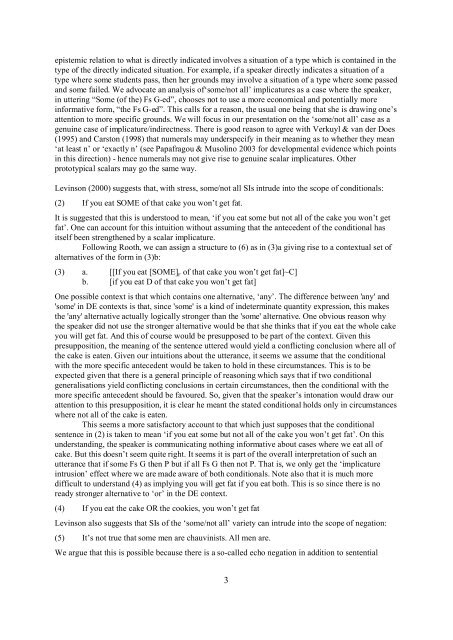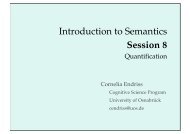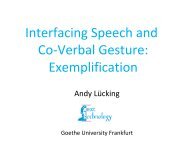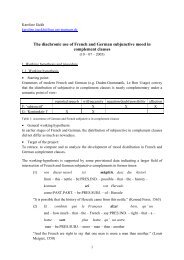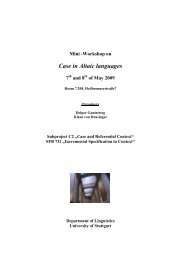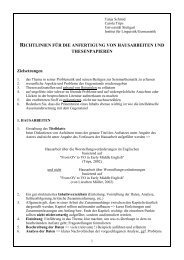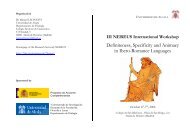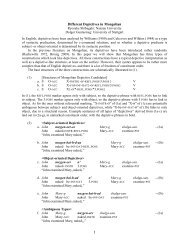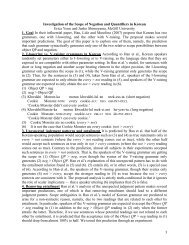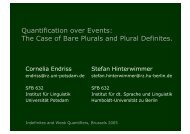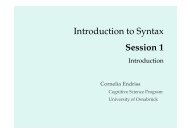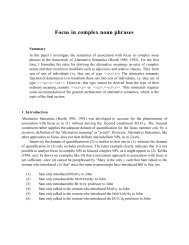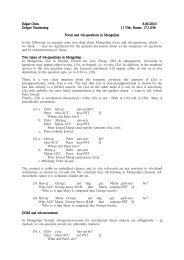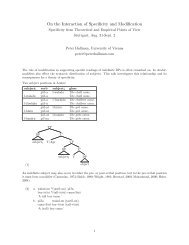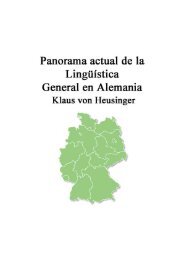SemPrag03.Progr.pdf - Institut für Linguistik/Germanistik - Universität ...
SemPrag03.Progr.pdf - Institut für Linguistik/Germanistik - Universität ...
SemPrag03.Progr.pdf - Institut für Linguistik/Germanistik - Universität ...
Create successful ePaper yourself
Turn your PDF publications into a flip-book with our unique Google optimized e-Paper software.
epistemic relation to what is directly indicated involves a situation of a type which is contained in the<br />
type of the directly indicated situation. For example, if a speaker directly indicates a situation of a<br />
type where some students pass, then her grounds may involve a situation of a type where some passed<br />
and some failed. We advocate an analysis of‘some/not all’ implicatures as a case where the speaker,<br />
in uttering “Some (of the) Fs G-ed”, chooses not to use a more economical and potentially more<br />
informative form, “the Fs G-ed”. This calls for a reason, the usual one being that she is drawing one’s<br />
attention to more specific grounds. We will focus in our presentation on the ‘some/not all’ case as a<br />
genuine case of implicature/indirectness. There is good reason to agree with Verkuyl & van der Does<br />
(1995) and Carston (1998) that numerals may underspecify in their meaning as to whether they mean<br />
‘at least n’ or ‘exactly n’ (see Papafragou & Musolino 2003 for developmental evidence which points<br />
in this direction) - hence numerals may not give rise to genuine scalar implicatures. Other<br />
prototypical scalars may go the same way.<br />
Levinson (2000) suggests that, with stress, some/not all SIs intrude into the scope of conditionals:<br />
(2) If you eat SOME of that cake you won’t get fat.<br />
It is suggested that this is understood to mean, ‘if you eat some but not all of the cake you won’t get<br />
fat’. One can account for this intuition without assuming that the antecedent of the conditional has<br />
itself been strengthened by a scalar implicature.<br />
Following Rooth, we can assign a structure to (6) as in (3)a giving rise to a contextual set of<br />
alternatives of the form in (3)b:<br />
(3) a. [[If you eat [SOME] F of that cake you won’t get fat]~C]<br />
b. [if you eat D of that cake you won’t get fat]<br />
One possible context is that which contains one alternative, ‘any’. The difference between 'any' and<br />
'some' in DE contexts is that, since 'some' is a kind of indeterminate quantity expression, this makes<br />
the 'any' alternative actually logically stronger than the 'some' alternative. One obvious reason why<br />
the speaker did not use the stronger alternative would be that she thinks that if you eat the whole cake<br />
you will get fat. And this of course would be presupposed to be part of the context. Given this<br />
presupposition, the meaning of the sentence uttered would yield a conflicting conclusion where all of<br />
the cake is eaten. Given our intuitions about the utterance, it seems we assume that the conditional<br />
with the more specific antecedent would be taken to hold in these circumstances. This is to be<br />
expected given that there is a general principle of reasoning which says that if two conditional<br />
generalisations yield conflicting conclusions in certain circumstances, then the conditional with the<br />
more specific antecedent should be favoured. So, given that the speaker’s intonation would draw our<br />
attention to this presupposition, it is clear he meant the stated conditional holds only in circumstances<br />
where not all of the cake is eaten.<br />
This seems a more satisfactory account to that which just supposes that the conditional<br />
sentence in (2) is taken to mean ‘if you eat some but not all of the cake you won’t get fat’. On this<br />
understanding, the speaker is communicating nothing informative about cases where we eat all of<br />
cake. But this doesn’t seem quite right. It seems it is part of the overall interpretation of such an<br />
utterance that if some Fs G then P but if all Fs G then not P. That is, we only get the ‘implicature<br />
intrusion’ effect where we are made aware of both conditionals. Note also that it is much more<br />
difficult to understand (4) as implying you will get fat if you eat both. This is so since there is no<br />
ready stronger alternative to ‘or’ in the DE context.<br />
(4) If you eat the cake OR the cookies, you won’t get fat<br />
Levinson also suggests that SIs of the ‘some/not all’ variety can intrude into the scope of negation:<br />
(5) It’s not true that some men are chauvinists. All men are.<br />
We argue that this is possible because there is a so-called echo negation in addition to sentential<br />
3


